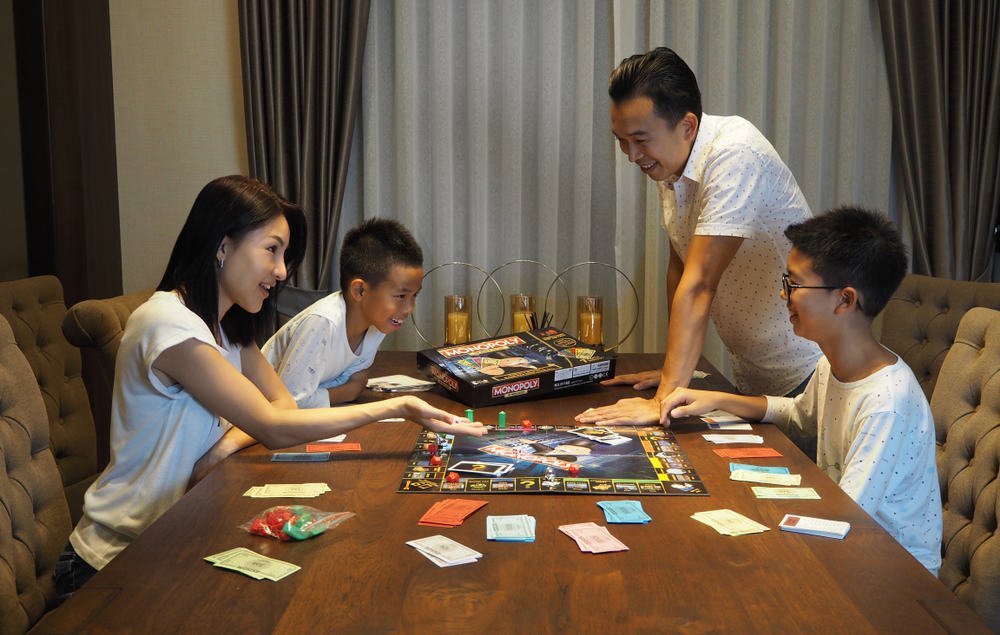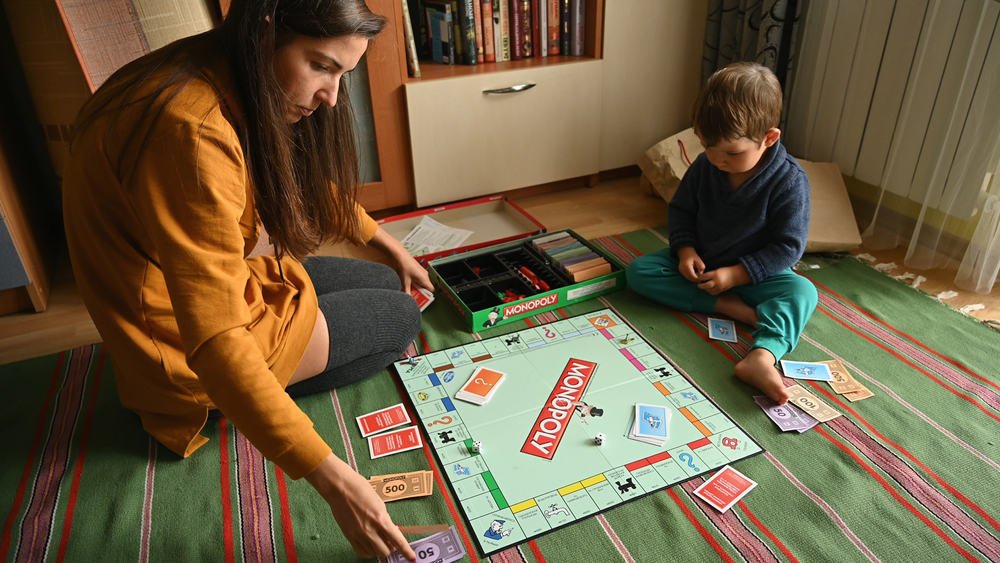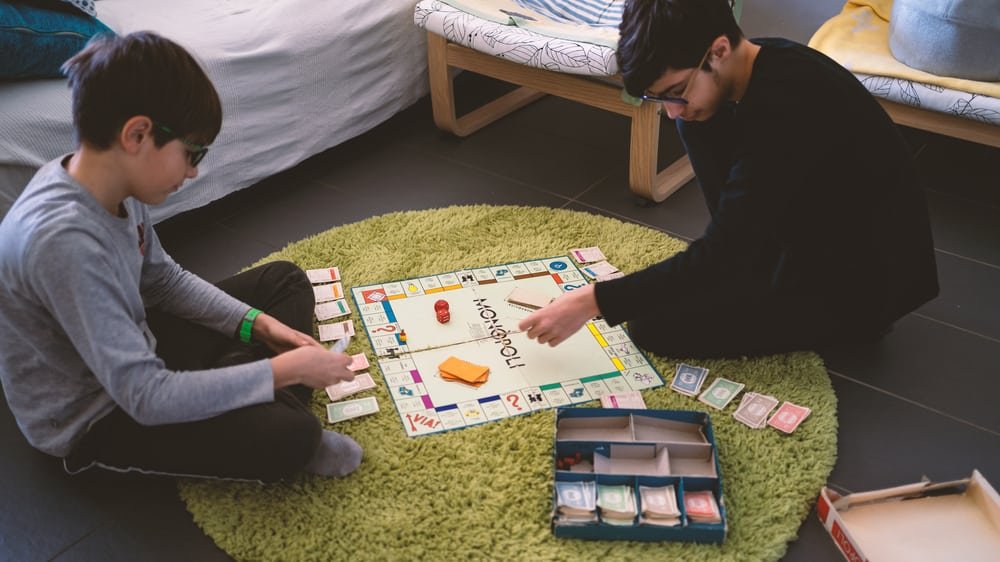Last Updated on January 7, 2024 by Gamesver Team and JC Franco

As a parent, you are undoubtedly keen to be in tune with what’s best for your children. You want them to attend a good school, make decent friends, develop meaningful connections, and of course, get involved in games and activities that are educational and inspire personal growth. One family favorite game is Monopoly, and I was recently pleasantly surprised to find out just how much kids can derive from playing this game regularly.
There are many life lessons that children, teens, and adults can learn from playing Monopoly regularly. Ready to start playing Monopoly with your kids but want to learn a bit more about the potential benefits and advantages?
While doing my research, I found an article from The New York Times that mentions something extremely interesting about the game. The author, Mary Pilon, states the following about Monopoly:
“… Monopoly’s origins begin not with Darrow 80 years ago, but decades before with a bold, progressive woman named Elizabeth Magie …
Magie filed a legal claim for her Landlord’s Game in 1903, more than three decades before Parker Brothers began manufacturing Monopoly. She actually designed the game as a protest against the big monopolists of her time — people like Andrew Carnegie and John D. Rockefeller.”
The New York Times – Mary Pilon
As you can see, perhaps Monopoly was always intended to teach people something.
Without further ado, below are 21 reasons why kids should play Monopoly (and the benefits too) – check them out:

These are 21 reasons your kids should play Monopoly. Monopoly:
1. Teaches the basics of money management.
Monopoly is all about money management. You need to get money, keep money, and spend money wisely. While a player may start off by spending too much too soon or investing in too few high-cost properties, these failing strategies will soon start to change. Learning to manage money on the Monopoly board is a valuable lesson in real-life money management for children.
2. Enhances cognitive development.
Playing games and interacting with others is essential to a child’s cognitive development. Monopoly gets a child thinking, which is great for learning to process information effectively, conceptualize possible solutions, and how to communicate through effective language learning. The more your child is exposed to games like Monopoly, the more your child can develop cognitively.
If you want to learn more about it, I’ll suggest you check the following YouTube video “How Board Games Boost Kids Cognitive Skills” from the channel The Genius of Play.
3. Develops key decision-making skills.
In order to progress and succeed at a game of Monopoly, players need to be thinking, negotiating, and making good deals. The deals made must be beneficial to the player financially immediately and in the long term (a little further along the board). This teaches children the importance of thinking possible options through before making a decision and also how to make definitive decisions.
4. Introduces the concept of money lending.
In the game of Monopoly, players can buy and sell properties. If a player sees an opportunity to buy a property that will increase their revenue, they may do so, even if they don’t have the available funds. Loans can be made only from the bank and only be mortgaging properties.
While the concept is kept simple in the game, it is a great way to expose your children to the concept of making a loan and the responsibility that goes along with it. Children can learn that loans don’t come free and that only strategy and hard work can get those loans paid off.
5. Boosts mathematics ability.
Of course, when there is money involved, kids will quickly learn to add and subtract. For smaller children, playing Monopoly can also be very good for learning how to count. For instance, when a child has to move forward 10 spaces, they can count from 1 to 10 out loud while moving spaces back and forth on the board. Counting money and subtracting money when “paying” for something is also a good way to teach smaller children about basic arithmetic.
6. Develops effective negotiation skills.
Monopoly is not purely a game of luck. It also requires negotiation skills. When striking deals, negotiation is a key element to coming out on top. In fact, I would go as far as to say that negotiation skills are essential to winning at Monopoly. Children will be able to learn that negotiation isn’t a one-sided thing. When negotiating, both parties need to have something to gain and both need to act fairly. This is a valuable life lesson for children.

7. Cultivates a positive attitude towards money.
When growing up, children can develop a negative attitude towards money, especially when they are consistently told that things are too expensive or told “no” to the things they want. Monopoly is a fun and lighthearted game that exposes children to the responsibilities and frustrations of having money of their own, to manage. Because it is fun and educational at the same time, it helps children to learn a more positive attitude towards money.
8. Develops the importance of being goal-oriented.
In a game of Monopoly, children are taught to set goals by targeting certain properties and mentally preparing for outsmarting other players. Without setting goals and then working towards achieving them, the game might become dissatisfying to the players. By learning how rewarding achieving goals can feel, children will learn just how valuable goal setting can be in everyday life.
9. Enhances the ability to deal with adversity.
When playing Monopoly, some players create situations of adversity, but players should not get upset as it is just part of the game and the process. Through learning how to handle these situations while being a “good sport”, children will learn that some situations in life are unpleasant or don’t go their way strictly and that they have to handle it with integrity and a good attitude regardless.
10. Teaches effective budgeting.
Learning to budget the available funds in Monopoly is something that kids can apply to their real lives. By dealing with budgets in a game environment, children can start to think about budgeting and the role it plays in real life.
11. Enhances executive function skills.
Executive function skills are essential to a child’s development. If a child never develops executive function skills, he/she will struggle with focusing, handling emotions, or following directions. Because of the way Monopoly requires a child to think, consider, focus, and remember, it is a great game for helping children develop mental skills that enhance executive function, including memory, self-control, and flexible thinking.
12. Promotes family bonding (bridges the generational gap).

It can be hard for the youngest and oldest family members to find something in common and to actually bond and have fun together. For years, Monopoly has bridged the generational gap for many families. Both young and old can get involved, and the game itself provides common ground to laugh, share, and have fun.
13. Teaches the concept of not putting all your eggs in one basket.
Children don’t automatically consider possible mishaps and failures. If a child never learns the possibility of losses by putting all their faith or investment in one property, they might make poor decisions in the future. Monopoly teaches children from a young age to diversify their investments so that their finances are never tied to just one investment. In later years, this lesson will prove highly valuable.
14. Helps to develop patience.
Monopoly is not a quick game. When it is played correctly, the game usually lasts around 60 – 90 minutes. For children who lack patience, this can be quite difficult, but by keeping young children in the game, involved and engaged, you can teach them to develop patience by applying themselves.
15. Boost concentration skills.
In order to keep up with the game, children need to be aware and alert to what is happening in the game. Again, it can be hard to keep children in one spot for more than an hour, but it is something that can develop over time. The more you expose your child to Monopoly, the more chance he/she has of developing good concentration skills.
16. Provides an alternative to a time out.
Some parents choose a time out for children misbehaving, but others use board games such as Monopoly to redirect a child’s focus and get them interacting and behaving appropriately. Instead of sending your child to the room or naughty corner, perhaps insist that they play a few board games with you. It’s a great alternative to a time-out and helps your child to work through the behavioral issues with you, instead of alone in the room/corner.

17. Teaches the art of graceful losing.
Sometimes you win at Monopoly and sometimes you lose. Losing can be immensely disappointing and frustrating as the game takes a few hours to play (investment of time and energy). Of course, to play board games, children need to learn that they cannot always win – that’s not how life works. This is one of the most valuable lessons that children can learn in life.
18. Is a healthy way to pass the time (keeps kids out of trouble).
Bored children often get themselves into trouble either by being naughty or getting involved with the wrong crowd. A games night with Monopoly is a great way to keep your children out of trouble, entertained, and having fun. Order some pizza, haul out the Monopoly board, and spend the night battling it out over the Monopoly board.
19. Teaches how to invest sensibly.
There are many opportunities for a player to invest in Monopoly, but not all investments are equal. In order to win, players must learn to make sound investments, which takes a bit of forethought. By working with your child, you can teach him/her how to consider the possible investments and make the right, sensible choice. This skill can be applied to other areas of their lives later on.
20. Acts as an equalizer and boosts confidence.
Developing social and interpersonal skills with adults is a great way to put children on an equal footing and boost their confidence. In a game of Monopoly, there’s no saying which player will do well and win – it could be a child or a parent. This is a great confidence boost and essential to development in real life.
21. Is entertaining as well as educational at the same time.

If you want to expose your children to games that are as educational as they are fun, you need to be picky about the games that you choose. Monopoly is one of the most financially educational games on the market, and there’s no denying that it is heaps of fun for the whole family.
Last Word
You might never have guessed that Monopoly could be quite so beneficial to children, but the simple reality is that it is. So, should your kids play Monopoly? I would say that the 21 benefits listed above are reason enough to believe that all children should. If you’re already heading out to buy a Monopoly game set; here’s to many years of fun, laughter, and family bonding!

